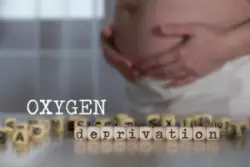
Developmental disabilities brought on by oxygen deprivation can include a number of lifelong conditions. Even mild oxygen deprivation may lead to developmental and cognitive concerns in some cases. Birth injuries linked to asphyxiation before or during birth include:
- Cerebral palsy
- Epilepsy
- Attention deficit disorder (ADD)
- Impaired vision or hearing
- Delays in speech and other language concerns
- Damage to organs including the heart, lungs, kidneys, and more
In some cases, the effects of oxygen deprivation may not be apparent until the child reaches preschool or school age, and developmental disabilities may never be linked to insufficient oxygen during birth. However, some of these issues can be avoided by getting oxygen to the deprived child quickly so they can be treated.
In some cases, brain cells may die because of a lack of oxygen and the additional release of toxins from the damaged brain cells after it begins receiving oxygen again.
Causes of Oxygen Deprivation Before, During, and After Delivery
Many problems can lead to an infant receiving insufficient oxygen in the womb, during delivery, or after birth. Many of these may occur because of negligence or careless behavior on the part of the doctor or other medical care providers.
Common causes of oxygen deprivation include:
- Lack of oxygen in the mother’s blood
- High or low maternal blood pressure
- Placental abruption, in which it is separated from the uterus, or other issues with the placenta
- Certain infections
- Umbilical cord accidents
- Stalling during the second stage of labor, when the baby is in the birth canal
- Something blocking the baby’s throat
While it is obvious there may be a concern if a baby is not breathing when it is born, some cases of oxygen deprivation are not as clear. These cases can still lead to developmental disabilities. Perinatal asphyxia occurs in two out of every 1,000 births in developed countries, according to 2020 statistics published by the National Center for Biotechnical Information (NCBI). Of those cases, 15 to 20 percent die while 25 percent are left with permanent neurological deficits.
"If your child was born with a birth injury, or cerebral palsy, we can help."
Treatment may Help Children Live With Developmental Disabilities
If developmental disabilities are brought on by oxygen deprivation, parents should work closely with their child’s doctors and therapists to put a plan in place for long-term recovery. This may include medications, physical therapy, occupational therapy, speech therapy, and more.
In the United States, some children with developmental disabilities can receive extra help before they reach age three through early intervention programs and accommodations at school. The U.S. Individuals with Disabilities in Education Act (IDEA) served 388,694 infants and toddlers in 2017 according to its 2019 Report to Congress.
In addition, treatment for other symptoms, such as tremors from cerebral palsy or seizures from epilepsy, may make it easier for the child to keep up with their peers both in the classroom and social settings.
You may be Able to Hold a Negligent Doctor or Hospital Liable
Medical conditions caused by oxygen deprivation during birth may occur as a result of negligence on behalf of medical professionals. If your doctor or another care provider could have taken steps to prevent the loss of oxygen or to restore your child’s breathing sooner, this may be a case for medical malpractice. Each state has its own statute of limitations and may have its own rules allowing you to toll the statute of limitations for birth injury cases, so it is best to speak with a lawyer familiar with the laws in your state.
During a consultation with a birth injury laywer, you can discuss your child’s diagnosis, their treatment and needs, and other factors related to your case. Using this information, the law firm can determine if you may be entitled to compensation by holding the doctor, hospital, or another party accountable.
Proving this type of case can require:
- Analyzing all relevant medical records
- Working closely with medical experts
- Presenting testimony to show medical malpractice occurred
- Documenting your current and future expenses and losses
The compensation you may be entitled to can include medical treatment coverage and additional tangible losses, as well as pain and suffering or other intangible losses.
"We know first-hand what you are going through."
Get Help and Learn More About Your Legal Rights
The Birth Injury Lawyers Group can help you understand your case and get started on taking legal action. Call (800) 222-9529 to receive a free review of your case with a member of our team.
"We are committed to helping families who have suffered medical negligence."

